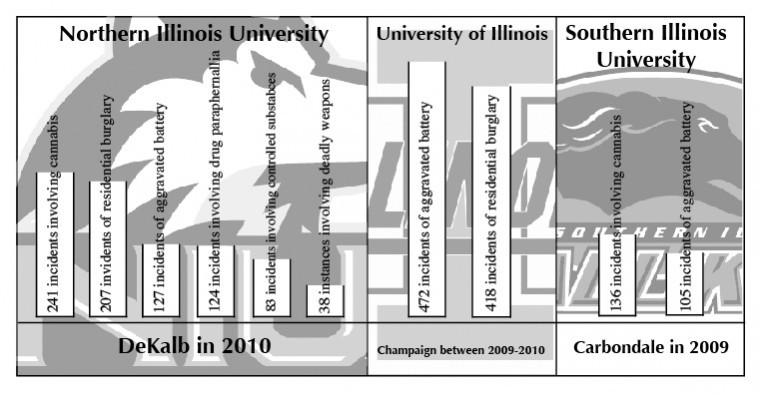Feithen: DeKalb’s perception as unsafe may be unfounded
September 6, 2011
DeKalb’s problem with drugs and violence may be more perception than reality, said DeKalb Police Chief Bill Feithen.
Feithen said three high-profile incidents that have occurred in DeKalb within the last few years -the Feb. 14, 2008 shooting at Cole Hall, the Antinette “Toni” Keller homicide in October 2010 and the April 5 shooting of NIU linebacker Devon Butler – have been uncharacteristic of the DeKalb community.
“I think the community has taken a bad rap, especially when you compare [DeKalb] to other university towns,” Feithen said.
DeKalb Mayor Kris Povlsen said DeKalb’s Safe and Quality Housing Task Force has looked into the perception of a drug and violence problem in the city and have found DeKalb’s statistics to be similar or better than other university towns.
“We have had several tragic incidents, but those created more headlines than statistics,” Povlsen said. “Headlines don’t make statistics.”
Carbondale, home of Southern Illinois University at Carbondale, reported 105 incidents of aggravated battery in 2009, 13 more instances than DeKalb reported the same year. Carbondale also reported 136 incidents involving cannabis in 2009, 21 fewer than DeKalb, which reported 157 incidents involving cannabis the same year.
In Champaign, home to University of Illinois at Urbana-Champaign, the Police Department reported 472 incidents of aggravated battery between fiscal year 2009 and 2010, 253 more than DeKalb, which reported 219 total instances in calendar year 2009 and 2010.
Champaign also reported 418 incidents of residential burglary between FY 2009 and 2010, 14 fewer than DeKalb, which reported 432 total burglaries in 2009 and 2010 combined.
NIU Police Sgt. Alan Smith said while there are students on campus who do drugs such as marijuana or cocaine, the NIU Police Department does not typically come across harder drugs like heroin.
NIU recently made changes to how it deals with drug and alcohol policy violations – sanctions are now tiered penalties that vary in severity for first, second and third-time offenders.
Smith said NIU Police take each arrest individually, and penalties depend on the circumstances of the incident and if NIU police have had prior contact with the offender.
In an Aug. 31 Northern Star article, Student Association President Elliot Echols said he supported NIU’s new policies “so that we can take our school back from the perceived violence and drug problem.”
Senior communications major Danny Collins said there doesn’t seem to be more of a drug problem in DeKalb than in other towns.
“It doesn’t seem like there’s much of a problem,” Collins said. “But the media surrounding drug-related arrests causes the perception of a drug problem.”
Senior mathematics major Mohammad Farraj also said he doesn’t think there is a drug problem in DeKalb.
“While there are drugs around, they aren’t as prevalent as they could be,” Farraj said. “We don’t hear about kids overdosing every day.”
David Jacobson, DeKalb First Ward Alderman, declined to comment for this article.
Editor’s note:
The figures provided by the cities of Carbondale, Champaign and DeKalb came from 2009 and 2010 annual reports. The figures within those reports were formatted differently for the three cities and therefore may not be exactly comparable based on time frame and nature of the crime. Reports from Macomb, Ill., home of Western Illinois University were not immediately available.
BY THE NUMBERS:
NIU-DeKalb in 2010:
38 incidents involving deadly weapons
124 incidents involving drug paraphernalia
83 incidents involving controlled substances
241 incidents involving cannabis
127 incidents of aggravated battery
207 burglaries
Southern Illinois University- Carbondale in 2009:
105 incidents of aggravated battery
136 incidents involving cannabis
University of Illinois- Champaign between 2009 and 2010:
472 incidents of aggravated battery
418 incidents of residential burglary







